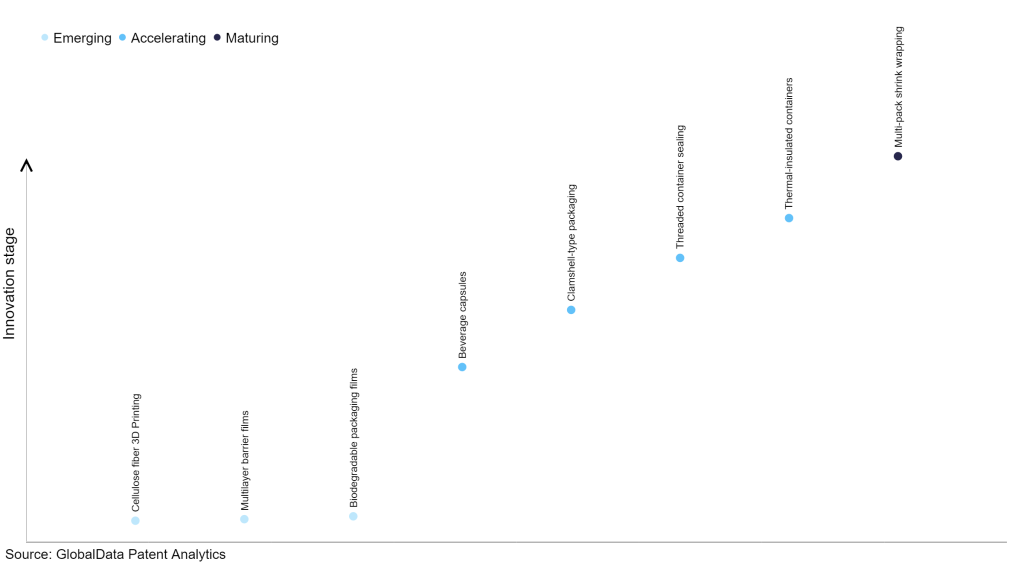The packaging industry continues to be a hotbed of patent innovation. Activity is driven by sustainability, smart packaging, light weight, convenience, and ease of handling and growing importance of technologies such as 3D printing, artificial intelligence, and nano technology. In the last three years alone, there have been over 18,000 patents filed and granted in the packaging industry, according to GlobalData’s report on Innovation in packaging: thermal-insulated containers. Buy the report here.
However, not all innovations are equal and nor do they follow a constant upward trend. Instead, their evolution takes the form of an S-shaped curve that reflects their typical lifecycle from early emergence to accelerating adoption, before finally stabilizing and reaching maturity.
Identifying where a particular innovation is on this journey, especially those that are in the emerging and accelerating stages, is essential for understanding their current level of adoption and the likely future trajectory and impact they will have.
30+ innovations will shape the packaging industry
According to GlobalData’s Technology Foresights, which plots the S-curve for the packaging industry using innovation intensity models built on over 83,000 patents, there are 30+ innovation areas that will shape the future of the industry.
Within the emerging innovation stage, cellulose fiber 3D Printing, multilayer barrier films, and biodegradable packaging films are disruptive technologies that are in the early stages of application and should be tracked closely. Beverage capsules, clamshell-type packaging, and threaded container sealing are some of the accelerating innovation areas, where adoption has been steadily increasing. Among maturing innovation areas are thermal-insulated containers and multi-pack shrink wrapping, which are now well established in the industry.
Innovation S-curve for the packaging industry

Thermal-insulated containers is a key innovation area in packaging
Thermal-insulated containers are packaging containers designed to store and transport items that require temperature regulation, such as automotive parts or food products. These containers are typically made of thermo-plastic material and are equipped with sealing systems to prevent the entry of humidity and liquids. They are designed with specific structural characteristics that reduce material usage, while maintaining mechanical resistance. Thermal-insulated containers also feature pressure relief valves, hinged flaps, stacking means, and tamper-evident mechanisms for secure and efficient storage.
GlobalData’s analysis also uncovers the companies at the forefront of each innovation area and assesses the potential reach and impact of their patenting activity across different applications and geographies. According to GlobalData, there are 395+ companies, spanning technology vendors, established packaging companies, and up-and-coming start-ups engaged in the development and application of thermal-insulated containers.
Key players in thermal-insulated containers – a disruptive innovation in the packaging industry
‘Application diversity’ measures the number of applications identified for each patent. It broadly splits companies into either ‘niche’ or ‘diversified’ innovators.
‘Geographic reach’ refers to the number of countries each patent is registered in. It reflects the breadth of geographic application intended, ranging from ‘global’ to ‘local’.
Patent volumes related to thermal-insulated containers
Source: GlobalData Patent Analytics
Berry Global Group is one of the leading patent filers in thermal-insulated containers. Some other key patent filers in the space include Yeti, Crown, and Silgan. Knauf Industries Group acquired the Overath Group, a company known for its production of technical components made from expanded polypropylene (EPP) for the automotive sector, custom parts for various industries, and the manufacturing of thermal insulated boxes.
In terms of application diversity, Berry Global Group leads the pack, while Yeti and Silgan stood in the second and third positions, respectively. By means of geographic reach, Seda held the top position, followed by Reckitt Benckiser Group and Unilever.
Thermal-insulated containers will find increased application across the food industry in the coming years. The rise of food delivery services created a higher demand for thermal-insulated containersas they help keep food at the desired temperature during transit, ensuring that customers receive their orders hot or cold, as desired.
To further understand the key themes and technologies disrupting the packaging industry, access GlobalData’s latest thematic research report on Packaging.
Data Insights
From

The gold standard of business intelligence.
Blending expert knowledge with cutting-edge technology, GlobalData’s unrivalled proprietary data will enable you to decode what’s happening in your market. You can make better informed decisions and gain a future-proof advantage over your competitors.



